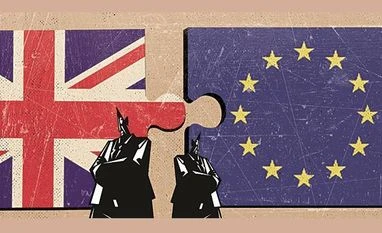Many pro-Brexit Brits are taken with the idea that the UK doesn’t need to belong to a large bloc any more than its tiny former colony Singapore does. The Southeast Asian city-state, they argue, has flourished by lowering taxes and opening up its economy to trade and investment, and so can a post-Europe Britain. Those excited about the prospects for “Singapore-on-Thames,” though, might want to take a closer look at how Singapore itself works. Or doesn’t.
It is true that the tropical port has thrived on trade since before Sir Stamford Raffles landed there 200 years ago. British colonisers encouraged free flows of capital, goods and labour, which integrated the island into the region’s colonial-plantation export economy.
Singapore’s post-independence leader Lee Kuan Yew also saw the virtue in positioning his country within global trade flows. In recent years, even as a backlash against globalisation has swept the West, Singapore has been an avid joiner of regional and bilateral free-trade pacts, including most recently the Comprehensive and Progressive Trans-Pacific Partnership and a free-trade agreement with the European Union.
Several other conditions have been critical to Singapore’s growth, though. And many of them won’t be so attractive to passionate Brexiters.
The state, for instance, plays an exceptionally heavy role in Singapore’s economy and society. Over 80 percent of the population lives in public housing, while a Central Provident Fund requires employees to park nearly 40 percent of their salaries into savings (the money can be used on housing and healthcare). In industrial policy, the government oversees a plethora of schemes targeting mostly off-budget public funding to particular sectors such as biopharma and aerospace, as well as activities such as R&D and skills training. Government-linked companies, whose controlling shareholder is the sovereign wealth fund Temasek Holdings Pte Ltd, are the dominant players in transport, communications, real estate and media, and account for a significant share of total stock-market capitalisation.
The state’s dominance makes negotiating free-trade agreements much easier than it would be in a post-Brexit UK. The ruling People’s Action Party has commanded an overwhelming majority in Parliament since independence and never loses a vote. Local labour and domestic capitalists are relatively weak, and the country has no agricultural sector to protect. Internationally, Singapore’s small size, openness and longstanding friendliness to foreign business mean it poses no threat to domestic interests in partner countries, while its strategic geographical location makes it an attractive intermediary for entry into a much larger regional market. It will be much harder for the UK to negotiate similar pacts, especially if it can’t serve as a gateway to the EU.
More importantly, given its tiny population, Singapore’s growth has depended crucially on massive immigration —one of the fears that spurred the Brexit vote. Non-residents accounted for only 3.2 per cent of Singapore’s labour force in 1970. By 2000, the share had risen to over 28 per cent and now tops 38 per cent. Following a backlash in 2011, which handed the PAP its worst electoral showing ever, the government has brought down the annual increase in foreign labour from 21 per cent in 2008 to around 1 per cent. But it’s still growing.
Moreover, Singapore has been an austerity lover’s dream, running budget surpluses of over five per cent of GDP nearly every year since 1990. Combined with high savings rates (35 per cent to 53 per cent of GDP since 1981), that’s translated into persistently large current-account surpluses that have exceeded 10 percent of GDP since 1991 and 20 per cent since 2005. These surpluses yield foreign-exchange reserves that are invested outside the country by GIC Ltd, the other sovereign wealth fund. Exporting capital restrains currency appreciation and keeps Singaporean exports competitive. In a more substantial, less-open economy such as the UK, such policies would be considered “mercantilist.”
The final irony is that Singapore may not be as clear-cut a success story as Brexiters imagine. A growth model based on large inputs of capital and imported labour has delivered poor productivity growth. Annual total factor productivity growth fell from 2 per cent in the 1980s to 1.4 per cent in the 1990s and 0.5 per cent in the 2000s, when employment contributed 75 per cent to (now lower) GDP growth, versus 31 per cent in the 1970s.
At the same time, like the UK and many other high-income countries, Singapore has experienced relative wage stagnation and rising income inequality. The share of wages and consumption in GDP is very low, with the latter ranging between 35 and 49 per cent of GDP every year since 1981. This means that consumer welfare is much lower than Singapore’s high per capita income would suggest, and lower than in countries with similar income levels.
Even Singapore’s liberal trade and investment policies are unlikely to yield the same growth dividends they did in the past, given the slowdown in globalisation and the rise of market, technological and political forces that favour increased regionalisation if not nationalisation of production and distribution of goods and services. Global capital flows in particular face increased restrictions meant to combat tax-dodging, while countries everywhere are far less tolerant of industrial policies that can be cast as “illegal” state subsidies.
It’s not clear that Singapore’s past national development strategy will continue to be viable for Singapore itself. Singapore-on-the-Thames shouldn’t count on following the same model.
The writer is a Singaporean economist and professor emerita of corporate strategy and international business at the Stephen M. Ross School of Business at the University of Michigan. ©2019 Bloomberg
Unlock 30+ premium stories daily hand-picked by our editors, across devices on browser and app.
Pick your 5 favourite companies, get a daily email with all news updates on them.
Full access to our intuitive epaper - clip, save, share articles from any device; newspaper archives from 2006.
Preferential invites to Business Standard events.
Curated newsletters on markets, personal finance, policy & politics, start-ups, technology, and more.
)